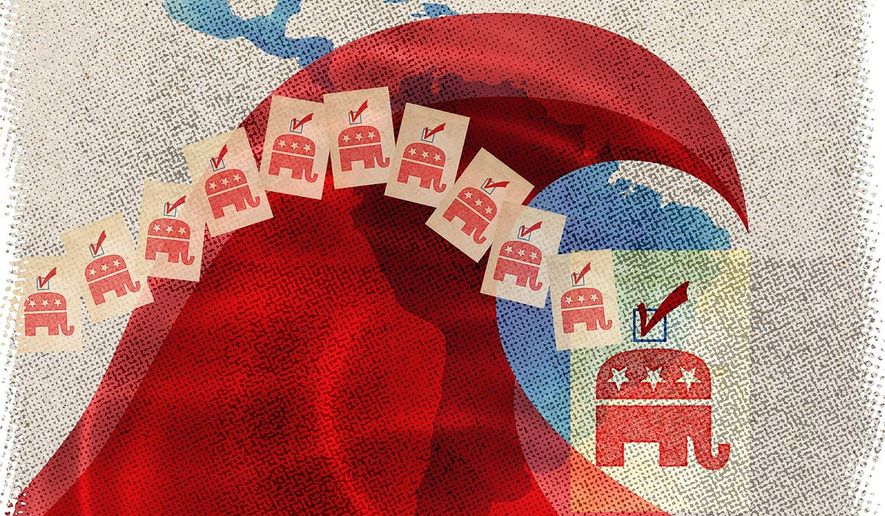OPINION:
While much of the post-election bickering focused on imaginary “red waves” and “blue walls,” there was a very real “anti-red wave” that swept Florida. It was led by Hispanic voters, who delivered a historic victory to Republican candidates across the state while delivering a striking rebuke to the Biden administration’s policy of appeasement of communist dictators, socialist governments and China’s expansion in Latin America and the Caribbean.
Home to the country’s largest diasporas of Americans of Cuban, Venezuelan, Nicaraguan and Colombian descent, among others, these communities in Florida have rallied around the leadership of Gov. Ron DeSantis, Sen. Marco Rubio and House members such as Reps. Mario Diaz-Balart and Maria Elvira Salazar in an effort to counter the Biden administration’s obsession with dismantling policies — regardless of the consequences — that were designed during the Trump administration to pressure and contain America’s foes in the region, while strengthening and rewarding America’s friends. The contrast in approaches couldn’t be more stark.
Last week, Venezuelan dictator Nicolas Maduro strolled the halls of the COP-27 climate summit in Egypt, carefree, as he chatted up the likes of French President Emmanuel Macron and U.S. envoy John Kerry. This would have been unthinkable just two years ago, when we led the largest coalition for democracy since World War II, with nearly 80 countries recognizing the legitimate constitutional government of interim President Juan Guaido, and designed one of the most comprehensive set of sanctions ever, including toward PdVSA, the Venezuelan oil company used as a piggy bank to bolster socialist regimes across the region.
Mr. Maduro was also indicted on narcoterrorism charges, and a $15 million bounty was placed on his capture. The pressure was so unbearable that just weeks before the November 2020 election, Mr. Maduro sent an envoy to discuss Caribbean locations for his exile, if President Donald Trump won reelection.
Meanwhile, in July 2021, the Cuban people led nationwide protests inspired by the theme “Patria y Vida” (“Homeland and Life”) against a regime that was severely crippled by new sanctions. These Trump-era sanctions strategically targeted the military’s monopoly over the economy, and for the first time since the Libertad Act’s 1996 enactment authorized Title III lawsuits against foreign companies that trafficked in properties stolen from Americans. Yet Cuban President Miguel Diaz-Canel’s regime brutally suppressed these protests, and hundreds of democracy advocates remain in prison without consequence. To the contrary, the Biden administration now seeks to normalize relations with both Messrs. Diaz-Canel and Maduro.
In Nicaragua, emboldened by the impunity of his allies in Caracas and Havana, President Daniel Ortega has fully transitioned to a totalitarian dictator and arrested every potential opposition candidate and even clergy. This is a far cry from Mr. Ortega’s desire to negotiate a democratic transition under the weight of our 2019 executive order and the Nica Act, which authorized and implemented sanctions against his energy and financial services conglomerates.
Dictatorships aside, an ideological “red wave” of elected socialist governments has also swept the region, thanks to the flagrant inconsistencies of the Biden administration, which rewards the region’s critics of U.S. policy toward Russia and Venezuela, like Mexico and Argentina, with White House visits, while it won’t even afford minimal commercial advantages to allies in Ecuador and Uruguay. It celebrates the election of “former” terrorist Gustavo Petro in Colombia with a phone call from President Biden within the hour, after previously keeping his center-right predecessor, Iván Duque, on ice without contact for months.
The Biden administration never had a kind word for Brazilian President Jair Bolsonaro and has accused Central American leaders of being corrupt — yet oozes excitement over the recent election of Brazilian socialist leader Lula da Silva, the most corrupt politician in the modern history of the region.
This creates fertile ground for China to further expand. In December 2019, we launched an initiative named “America Crece” (“Growth in the Americas”), which was composed of energy and infrastructure agreements with countries to stimulate and secure U.S. investment in these sectors, and counter Chinese state-owned entities. From its inception until January 2021, 16 countries in the region signed “America Crece” agreements, while the last Belt and Road deal with China in the region was signed in April 2019. In other words, the U.S. ran the scoreboard 16-0. Unfortunately, it was terminated on day one by the Biden administration, along with a timely “nearshoring” initiative, due solely to partisan shortsightedness.
Meanwhile, at the Inter-American Development Bank (IDB), which China joined in 2009 after paying a highly questionable $350 million “kickback,” the three Chinese funds created to co-finance nearly 100 projects in Latin America and the Caribbean with over $6 billion of IDB money over the past decade — of which U.S. taxpayers outrageously paid 30% of the bill — were finally shut down. This issue is ripe for a congressional investigation of how it ever happened. Instead, the Biden administration is looking to reinstate these Chinese funds.
The new Congress and its leaders, both Republicans and Democrats, would be wise to heed the call of the Hispanic “anti-red” wave and prioritize efforts to recalibrate Mr. Biden’s mistaken policies toward the hemisphere. As the adage goes, “good policy is good politics.”
• Mauricio Claver-Carone was deputy assistant to the president and senior director for Western Hemisphere affairs at the National Security Council from 2018 to 2020. He was president of the Inter-American Development Bank from 2020 to 2022.




Please read our comment policy before commenting.